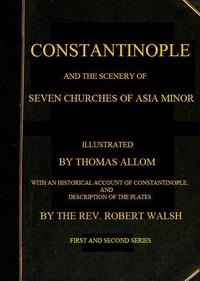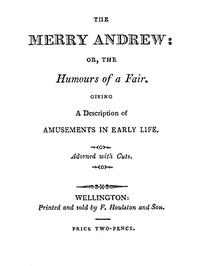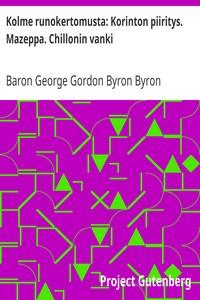Read this ebook for free! No credit card needed, absolutely nothing to pay.
Words: 104375 in 28 pages
This is an ebook sharing website. You can read the uploaded ebooks for free here. No credit cards needed, nothing to pay. If you want to own a digital copy of the ebook, or want to read offline with your favorite ebook-reader, then you can choose to buy and download the ebook.
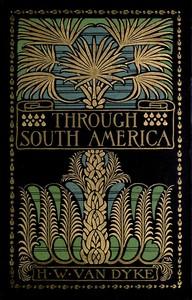

: Through South America by Van Dyke Harry Weston Barrett John Author Of Introduction Etc - South America Description and travel; South America History
I
HISTORICAL SKETCH
I
Venice and Genoa, grown rich and powerful through trade with India and the nearer countries of the Orient, had for a space enjoyed a prosperity and revival of culture that were felt throughout Christendom. Then had come the conquest of Spain and domination of the Mediterranean by the Moors, and, afterward, the wars of the Crusades, which had checked the Saracen advance but interrupted all other commerce with the infidels. Meanwhile, as though to compensate for this loss, the great Mongolian conqueror Genghis Khan had fulfilled his remarkable destiny and, instead of adopting measures to prevent it, invited western intercourse with the countries he had brought under his sway, and China, about which almost nothing was then generally known, was visited overland by traders, adventurers, and missionaries. Marco Polo, a Venetian, after spending more than twenty years in the far east, part of the time in the service of the Great Khan Kubilay, had returned by way of India and Persia, laden with jewels of enormous value, and had written a book descriptive of the countries he had seen and the wealth and customs of the people. In the fourteenth century, when the Mongolian dynasty was overthrown, the Asiatics had again turned hostile and the land route was closed.
But during this open season it had become known that Cathay was not the end of the world, as had been supposed--that there was an ocean beyond and the wonderful Island of Cipango and other islands rich in spices and costly products; and Europe began to wonder, since the Tartars barred the route by land, whether these desirable places might not be accessible by water. "Between wondering and the attempt," says Hawthorne, "there was a considerable interval, for the idea was too novel to be digested all at once. But it was an age of unbridled license of imagination and of desperate courage. The mere possibility of encountering perils never until then conceived of was allurement enough, as, even to-day, our young adventurers go forth to die on the ice fields of the north and south poles, or in the mysterious heart of savage Africa, or on the ghastly plateaux of Tibet. In addition, there were the fabulous rewards that success seemed to promise."
At first, though, if the plan of sailing west was even thought of, it would seem to have been regarded as less feasible than that of rounding Africa. Prince Henry, a son of King John I of Portugal--for it was the Portuguese, not the Spanish, who were the pioneers in this series of discoveries--determined to devote his life to the work. Retiring from the splendors of the Lisbon court, he built an astronomical observatory on the promontory of Sagres , extended its hospitalities to all the wise men of the age and sent out expedition after expedition to the south. "Until then," says Dawson, "nautical knowledge was very meager. The compass served only to indicate direction, not distance or position, and did not suffice for the systematic navigation of the open Atlantic. The Portuguese first made that possible by using astronomical observations and inventing the quadrant and astrolabe."
This knowledge, once acquired, was promptly applied. Madeira was discovered in 1418, the Canaries in 1427, the Azores in 1432. To the west the Portuguese ventured no farther, but, continuing south, they reached Cape Blanco in 1441, Senegambia and Cape Verde in 1445, the Cape Verde Islands in 1460, and the Gulf of Guinea in 1469. In 1471 they were the first Europeans to cross the equator. The idea was then conceived that they had only to keep on and they could round the southern extremity of the continent and reach Abyssinia and India by sea--a hope that was realized in 1487 when Bartholomew Dias arrived at last at the Cape of Good Hope. A few miles beyond, however, he was compelled by the condition of his crew to return and it remained for his compatriot Vasco da Gama some years later to double the cape and complete the voyage up the eastern coast and across the Indian Ocean to Hindustan.
II
The significance of these early voyages of the Portuguese lies in the fact that thereby it was demonstrated that a shorter route was needed--that with the very small and badly equipped vessels of the period the trip around the Cape of Good Hope, at least for commercial purposes, was impracticable; also in the fact that with Dias had sailed the Genoese navigator Bartholomew Columbus, a brother of the discoverer of America.
In his letter to Columbus he congratulates him on having undertaken an enterprise--
"Fraught with honor, as it must be, and inestimable gain and most lofty fame among all Christian peoples. It will be a voyage to powerful kingdoms" "and to cities and provinces most wealthy and noble. It will also be advantageous to those kings and princes who are eager to have dealings and make alliances with the Christians of other countries. For these and many other reasons, I do not wonder that you, who are of great courage, and the whole Portuguese nation, which has always had men distinguished in such enterprises, are now inflamed with a desire to make the voyage."
Thus encouraged, Columbus began his efforts to secure patronage and money for the expedition. He tried in his birthplace, Genoa, and in Portugal and Spain, even in England, where he was accompanied by his brother Bartholomew after the latter's return from the voyage to the Cape of Good Hope, and suffered many refusals. Toscanelli had been dead eight years before he at last succeeded; and then, had he known that the distance from Lisbon to the coast of Asia was in fact some 13,000 miles, or twice that which the astronomer had estimated, and that, even so, the route straight across was barred by the Isthmus of Panama--had he known that Cathay did not, as his mentor believed, extend some thousands of miles farther east than it does, even such a man as Columbus might have abandoned the project as chimerical when the cockleshells then available for ocean travel were taken into consideration. Nor, if she too had not been misled by the same "valuable pieces of ignorance," is it likely that his plea would have prevailed on the practical Isabella of Castile, however elated and invincible she may have felt over the taking of the last of the Saracen strongholds at Granada and the expulsion of the Moors from Spain, for in that she was engaged when Columbus finally succeeded in securing her aid.
Free books android app tbrJar TBR JAR Read Free books online gutenberg
More posts by @FreeBooks

: An Outline of the Phonology and Morphology of Old Provençal by Grandgent C H Charles Hall - Provençal language Grammar
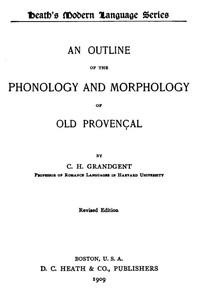

: Constantinople and the Scenery of the Seven Churches of Asia Minor Series One and Series Two in one Volume by Walsh R Robert Allom Thomas Illustrator - Istanbul (Turkey) History; Istanbul (Turkey) Pictorial works
